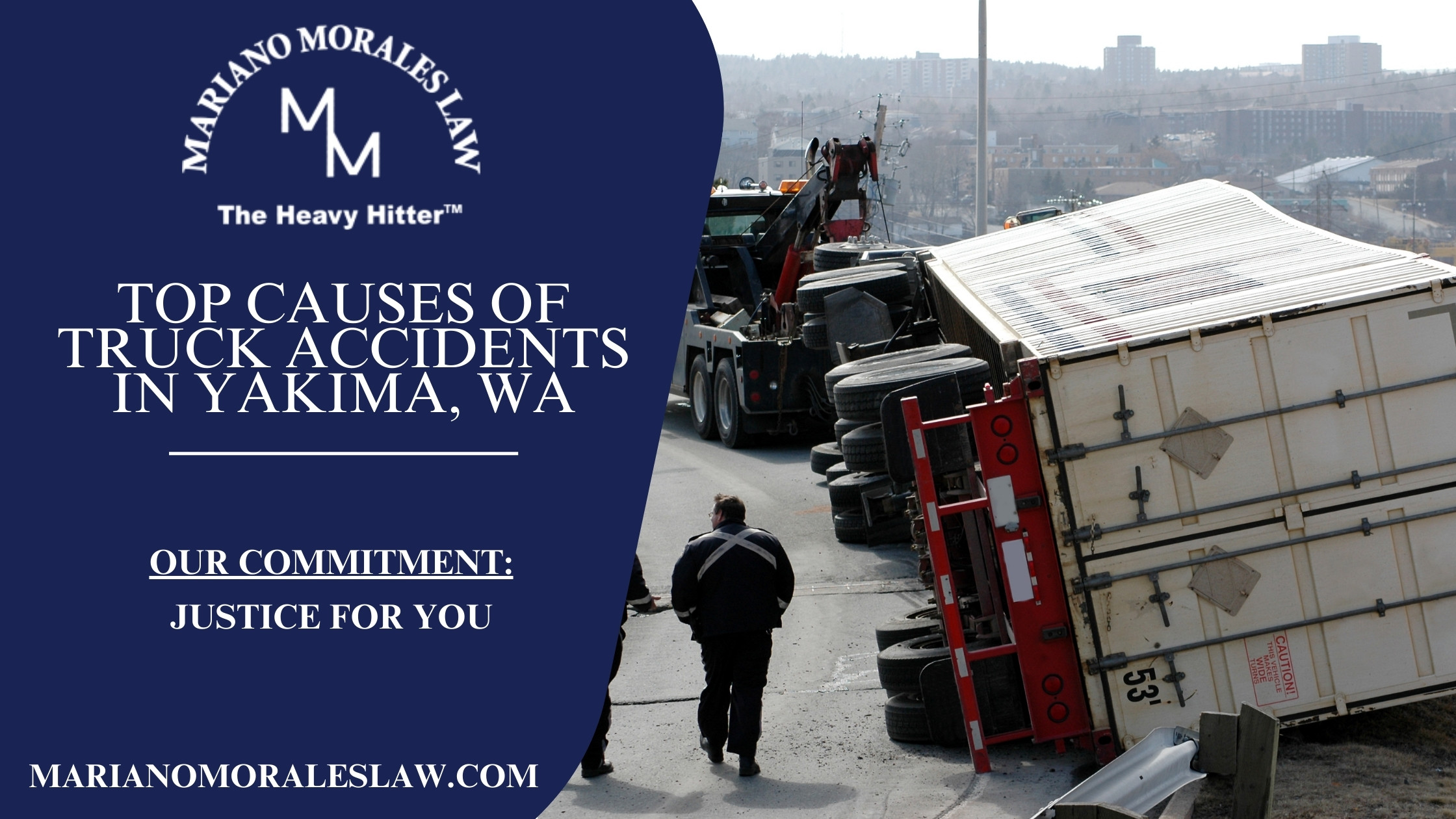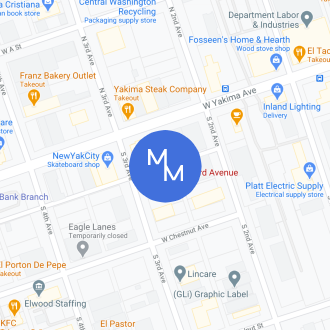Top Causes of Truck Accidents in Yakima, WA

Truck accidents in Yakima, Washington, and the surrounding areas occur for many reasons. Understanding why the crash happened is essential when crash victims need to seek compensation for their injuries. Determining liability is one of the first steps when filing a truck accident claim or lawsuit.
Our legal team at Mariano Morales Law can determine the cause and help you fight for maximum compensation. Contact our team today at (509) 853-2222 for a free consultation.
What Are the Top Causes of Truck Accidents in Yakima?
Driver Negligence
Every motorist has a duty of care to other motorists and pedestrians. Driver negligence occurs when a motorist puts others at risk by driving carelessly or recklessly.
Speeding
Speeding is a form of driver negligence. Any vehicle can cause significant damage when its operator exceeds the posted speed limit.
Speeding while operating a semi-trailer truck or similar large commercial vehicle can be particularly dangerous. A large truck has the potential to cause serious injuries when traveling at a high rate of speed. In addition, controlling a truck becomes more difficult the faster it’s traveling.
Distracted Driving
According to National Safety Council distracted driving has become an increasingly common cause of motor vehicle accidents in recent years. This is likely due to smartphone usage. However, any activity that takes a truck driver’s eyes, hands, or focus off the task of driving qualifies as a distraction.
Driving Under the Influence (DUI) or Impaired Driving
Truck drivers are officially over the legal limit for alcohol consumption when their blood alcohol concentration (BAC) is . Trucking companies should only hire drivers whose driving histories indicate they aren’t likely to drive while drunk or on drugs. Intoxication slows a driver’s reaction times, thought processes, and ability to make safe judgments.
Fatigue
Federal regulations prohibit truckers from driving for extended periods without taking breaks. Because operating a commercial motor vehicle requires focus and mental alertness, a truck driver needs adequate sleep to stay safe on the road. However, some truckers feel pressure from their employers to stick to tight delivery schedules and may neglect to take required rest breaks, increasing the risk of a truck accident. According to the Federal Motor Carrier Safety Administration (FMCSA), there were over 146,000 hours-of-service and log book violations in a recent year.
Improper Lane Changes
An improper lane change can take several forms. Examples include:
- Changing lanes without signaling
- Changing lanes illegally (e.g., crossing over double yellow lines)
- Changing multiple lanes at once
- Using a shoulder or turn lane to pass other vehicles illegally
Poor Weather Conditions
Not all truck crashes result from truck driver negligence. Bad weather and driving too fast for conditions can increase the odds of a serious accident.
Truckers need to account for weather conditions when driving. They should adjust their driving to account for harsh weather. Federal regulations state truck drivers have a legal duty to use extreme caution when driving in hazardous conditions, even if it means getting off the road. For example, it would be careless for a truck driver to operate their rig in icy conditions at the same speed they would on a clear day.
Road Conditions
All drivers should slow down and heed warnings relating to road conditions. Tractor-trailer operators should be particularly careful when road conditions turn dangerous because of the damage they can inflict if involved in a collision. Unfortunately, some truck drivers fail to heed those warnings and end up sliding, jackknifing, or colliding with another vehicle on ice, rain or snow-covered roads.
Mechanical Issues
A large truck is a complex vehicle. Like many complex machines, it relies on numerous parts to function reliably. If any systems fail, a wreck could occur.
After a truck accident, an investigation is necessary to determine who should be liable for the mechanical failures. The trucking company may be liable if the part failure resulted from poor maintenance, old tires or bad brakes. On the other hand, if the problem resulted from a design flaw or manufacturing error, the company(s) that designed or made the part might be liable for the semi-truck accident.
Cargo Shift
Preventing commercial truck accidents is not just the trucker’s responsibility. For example, cargo loaders must obey securement regulations to ensure they don’t overload trucks and that all cargo is properly stowed.
A cargo shift can cause a wreck in several ways. If a truck’s bed is open, cargo can fall onto the road. Even if the cargo is in an enclosed space, a significant cargo shift might result in a sudden change in weight distribution that could cause the truck driver to lose control or the truck to roll over or jackknife.
Blind Spots
Commercial trucks have large blind spots called “no-zones.” Truckers are required to check these blind spots carefully before maneuvering in traffic. If other vehicles are in a neighboring lane, their drivers will have nowhere to go and no way to avoid a collision.
Aggressive Driving
Aggressive driving is a general term for a range of behaviors that can put others at risk on the road. When a truck driver engages in aggressive driving, their tractor-trailer can become a weapon. Examples of aggressive driving include:
- Tailgating
- Constantly weaving in and out of traffic
- Not allowing other vehicles to pass or change lanes
- Passing other cars, then slowing down in front of them
Intersections
Intersections are common sites for many types of motor vehicle accidents. At a busy intersection, everyone must drive according to the law. If a driver does anything unpredictable, others may have to react suddenly. Since an 18-wheeler is larger and heavier than other cars, stopping takes more distance and time, and there may not be enough time to avoid a crash.
Unfamiliarity with the Area
Operating a truck in an unfamiliar area can be dangerous for several reasons. For example, a trucker may end up on a road not designed to accommodate such a large vehicle. A truck driver who thinks they’re lost might make sudden turns or lane changes while trying to return to the proper route. This is preventable by proper trip planning by the truck driver and company before departure. Truck drivers also should not be looking at navigation devices while driving.
Need to Discuss Your Truck Accident? Contact Our Yakima, WA, Law Firm Today
People who suffer serious injuries in Yakima truck accidents often experience physical, financial, and emotional hardships. If you were hurt in a truck crash and someone else is responsible, you may have the right to seek compensation for your injuries and losses.
A Yakima truck accident lawyer from Mariano Morales Law will leverage their experience, understanding of how insurance companies approach the claims process, and extensive knowledge of trucking industry regulations to pursue the money you deserve. Get started today by filling out our online form or calling (509) 853-2222 for your free case review.





 Site by
Site by